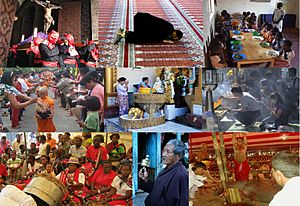Worldview facts for kids
A worldview is how a person or a group of people see and understand the world around them. It's like a special lens through which they look at everything. This includes their knowledge, culture, and their point of view. A worldview helps explain what they believe is true, what is important, and how they should act.
Contents
What is a Worldview?
A worldview is a set of basic beliefs and ideas that shape how someone sees the world. It's not just about what you know, but also how you feel and what you value. Your worldview helps you make sense of life and decide what to do.
Where the Word "Worldview" Comes From
The word "worldview" comes from the German word Weltanschauung. This word combines Welt (meaning 'world') and Anschauung (meaning 'perception' or 'view'). So, it literally means 'world-perception' or 'world-view'.
This German word is also used in English. It describes a broad way of looking at the world. It's like a framework of ideas and beliefs that helps a person, group, or culture understand and interact with the world.
How Our Minds See the World
In cognitive philosophy, Weltanschauung refers to how a group of people, a family, or an individual sees the world. This way of seeing the world often comes from their unique experiences over a long time. For example, the language a group speaks can show their worldview through its structure and meanings.
Early thinkers like Wilhelm von Humboldt and Immanuel Kant talked about similar ideas. They explored how our minds shape what we see as reality. They believed that our culture and language influence how we understand the world.
Anthropologists, who study human societies, describe worldviews as the basic ideas a group has about how things work. These ideas help them organize their lives. If you could draw a map of worldviews, it would cross political borders. This is because worldviews are shaped by shared experiences, geographical regions, climate, available resources, and even language families.
Comparing Different Worldviews
Think of a worldview as having several basic beliefs. These beliefs are like the starting points or rules of a game. You don't usually prove these basic beliefs within the worldview itself. Instead, you use them to understand other things.
If two different worldviews share enough common beliefs, people holding them can have good discussions. They can understand each other better. However, if worldviews are too different, it can be hard to find common ground.
Some people believe that there isn't one single "global truth." They think truth can be different for everyone. This is called cultural relativism. Others, especially those who believe in a universal truth, might disagree.
A different way to look at it is to study different worldviews without judging them. This means trying to understand how different religious or non-religious systems work. It's about exploring various beliefs in a neutral way.
What Makes Up a Worldview?
A worldview can be seen as a model of the world. It usually includes these important parts:
- An explanation of the world: How does everything work?
- A futurology: Where are we going? What will happen in the future?
- Values: What is right and wrong? What should we do?
- A praxeology: How should we reach our goals? What actions should we take?
- An epistemology: What is true and false? How do we know things?
- An etiology: Where do these beliefs come from? How was this worldview built?
Worldviews and Religion
Many religions have a strong worldview. For example, Nishida Kitaro wrote about "the Religious Worldview" to understand Eastern religions. For Christians, thinking about Christianity as a worldview has been very important.
Christian writer James W. Sire defines a worldview as a deep commitment. It's a basic way of thinking that can be told as a story or as a set of ideas. These ideas might be true, partly true, or false. We hold them, sometimes without even realizing it. They form the foundation for how we live. Sire suggests that we should all think about worldviews, both our own and others'. This helps us understand and communicate better in our diverse society.
Having a strong worldview can also inspire people to help the world. When a person's view of the world changes, they might feel motivated to serve others.
See also
In Spanish: Cosmovisión para niños


